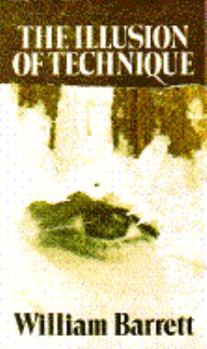Illusion Technq an
Select Format
Select Condition 
Book Overview
No Synopsis Available.
Format:Paperback
Language:English
ISBN:0385112025
ISBN13:9780385112024
Release Date:September 1979
Publisher:Anchor Books
Length:392 Pages
Weight:0.72 lbs.
Dimensions:0.9" x 4.2" x 7.0"
Customer Reviews
4 ratings
Not His Best, But Still Worthwhile
Published by Thriftbooks.com User , 18 years ago
This work is not up to the level of Irrational Man or The Death of the Soul, but it still bears the mark of Mr. Barrett's thoughtful iconoclasm. He challenges our culture's thoughtless and quite automatic pursuit of technology as the Grail of human endeavor, and with it the implicit assumption that all human problems are technical at their root. His measured reflections highlight both the obviousness of this bias and the dubiousness of its validity. He performs a brief but effective review of how this bias arose via Renee Descartes's influential philosophical tradeoff of a desacralized sensible world wherein science reigns supreme, for the separate and unchallenged province of religion on the other side of the equation. For better and for worse, the outcome has proven to be the elevation of Technique to the apogee of human concern, at least in the most "advanced"--meaning, technologically superior--societies. He effectively demonstrates the emptiness of techique per se, showing that it rests upon unexamined assumptions worthy of conscious reflection. Indeed, modern society has reached a crisis point where the mindless veneration of Method and Machine is literally destroying the natural world--the unremarked but crucially abiding foundation that occasions the possibility for technique and technology. Less effective are his (now dated) speculations about the future of American and Soviet societies, though they might be of interest to those who wish to evaluate the usefulness of his future focus. Troubling is his occasional dismissive oversimplification of philosophers not to his liking--Nietzsche is "satanic," e.g.--but this does not constitute the core of either the text or his arguments. Also less than satisfactory is his reflection upon the nature of faith. While taking William James to task for "psychologizing" the religious impulse, Mr. Barrett seems unable to offer more than "I do it because I do it" as an explication of his own religious observances and, by extension, those of others who incorporate religious practice into their lives. All this said, The Illusion of Technique is worthwhile reading . William Barrett is one of those philosophers who has contributed relevant works useful to thoughtful people who might lack technical background or familiarity with contemporary philosophical issues.
Great book, but philosophers shouldn't do fortune telling...
Published by Thriftbooks.com User , 21 years ago
What you've read in the other reviews is right, and I wish I was as erudite as Barrett. Let me start by saying I thoroughly recommend the book.Having said that, the juxtaposition of Skinner with Solzhenitsyn as alternative "futures" ignored, I think the rise of fundamentalism as a reaction to modernity that started actually before this book was written (Jerry Falwell was quite active before this book was in print). We've seen those results in 9/11, now.The balance I think Barrett's pointing to in the mystical versus the pragmatic/rational is good, and his writing can be extrapolated to see why some of these fundamentalisms have taken hold in places. The extrapolation's necessary, I think.One can also deconstruct this book to good results to approach that extrapolation. The title of the book, "The Illusion of Technique," rightly points to the futility of technical approaches to bring meaning to life.However, his prescription, practiced ritual enforcing faith, if not informed by a deep doubt, is basically "dead works," or "bad faith," something worse. His nihilist, I think, ultimately has the more moral position than either the believer or the scientific naturalist. Without the nihilist, the practiced ritual of faith is, at the end of the day, yet another technique.Today's Christian and Islamic fundamentalists practice both ritual and mysticism, and the lack of doubt and humility about where their movement is taking us- over the precipice that is- is a horrible future possibility.These are important ideas to on which to ponder; hopefully this book wil be back in print.
Sharply observed, excellently written
Published by Thriftbooks.com User , 22 years ago
Here is a sample of Barrett's prose."One of the disservices of positivism (for which the early Wittgenstein bears some responsibility) was to erect into dogma the slogan 'Mathematics tells us nothing about the real world.' The dogma should have been suspect from the start. It is entirely unlikely that we should have been able to build airplanes or launch rockets without the aid of mathematics."Here we see Barrett moving bravely through some areas of modern philosophy that are usually clogged with jargon and overly technical treatment, we see him dispensing with crutches, using plain language -- and he takes us with him.
Philosophy in the late XX century
Published by Thriftbooks.com User , 25 years ago
This is a wonderful introduction to many of the central philosophical questions of the twentieth century. The author focuses on Wittgenstein, Heidegger, and William James as a means to highlight the problems of elevating technique over substance. The book does not assume any familiarity with any of these philosophers, and so provides an entry into their thought. By focusing on Wittgenstein instead of the later logical positivists and Heidegger rather than Sartre or another existentialist, the author can bring out the true greatness of Wittgenstein and Heidegger compared to later philosophers. I recommende this book to anyone interested in critical thinking.






